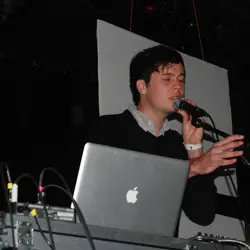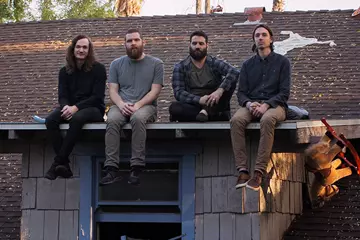 Washed Out
Washed OutAn album title can be a contract of sorts between artist and listener/consumer; expectations can be raised or lowered depending on the promise of the cover. You know exactly what's inside just looking at Slayer records with names like Reign In Blood and featuring the demonic artwork of Larry Carroll; Battles' Mirrored album also springs to mind, all reflective angles and hard lines. Some artists set out to subvert this. Deadmau5's >Album Title Goes Here< is a classic example, as is Faith No More's Album Of The Year. Some of the best titles employ subtle plays on words: The Beatles' Revolver (so good it was subsequently aped by Fugazi with their debut Repeater, and taken one step further with Public Enemy's Revolverlution) and Rubber Soul, Dylan's Blood On The Tracks and so on. There are, of course, inherent pitfalls: too earnest and you'll be labelled a dag, too cryptic and you're a wanker, too funny and you're not taken seriously, not funny enough and you're a twit.
Earnest Greene's musical outlet Washed Up's latest album is called Paracosm – a kind of detailed imaginary world, an invented alternate reality. It's a bold statement but Greene has by and large managed to live up to the premise and the promise. “As soon as I started work and figured out a sonic palette that worked it became almost this full-blown kind of concept album, which I never really anticipated,” he says. “I toured for quite a while with the last record and it didn't leave a lot of time for writing new music, so I had a lot of ideas that I'd just had in the back of my mind for the last couple of years and one of them was I wanted to write a pastoral-influenced record. For me that meant a lot of acoustic instruments and a lot of warm sounds and I think that was pretty much the first jumping off point.”
Dense birdsong opens the record as watery keys and percussion creep out of the surrounding emptiness followed by a flourish of strings and choral voices that lead you into the bubble. It's a lightweight listen; you could even say nothing really stands out. “I was very much thinkin' of it as a daytime record,” continues Greene. “I was trying to write an optimistic-sounding album and because of that I was writing mainly in major keys, so there's a little bit more light and it's a little bit more colourful [than past releases].”
The title itself was an accident – Greene stumbled across the word on the internet about halfway through the writing/recording process. “[It's] certainly influenced some of the lyrical content on the record,” he says. “I'd moved into a new house after touring, out in the country, and it was very much a change of pace moving from travelling and being on the road all the time to just working on music and being creative and being by myself, so in some ways I was kind of in this paracosm: a place away from everything and free to do whatever [I] [wanted].”
Don't miss a beat with our FREE daily newsletter
Greene went big on the album, incorporating over 50 instruments, clapping, chatting, chirping and laughter, indecipherable blurps and snaps, all rolled together under his paracosmic dome. “I'm probably pretty terrible at [project managing] so I definitely needed someone to do that,” Greene continues. “The mixes were definitely a lot more complicated than anything I've done before. I had kind of a rough draft already before actually taking it into a real studio and finishing off the rest of recording and mixing – we were sort of mixing all along, which made it a lot easier... There was a lot of conceptual stuff that made it so much easier as well, like, I knew that I wanted to use a lot more analogue effects and get away from digital.”
On this album Greene reckons he wrote each part with live performance in the back of his mind, though he's still had to strip away excess to take Paracosm on the road: “We don't have the means to travel with a string section. I feel like the songs are strong enough on their own to shear a lot of parts away and they'll still sound like the record. That's been an important part as well, to just kind of work on a skeletal version of a song and see what works and what doesn't.”
From the bones of such an abstract and unplanned concept, ultimately Greene's happy with the results. Listening to the thing, it does become its own feathery little cosmos. He says that working within the limitations of this world actually made the process easier. “There's definitely some lyrics on the record that don't have anything to do with the Paracosm idea, but sonically I think there is [a narrative thrust]. I had these limitations kind of set up from the beginning where I knew to use a certain type of sound, which really kind of helped with the songwriting because I was able to just jump straight into the actual writing of songs, whereas before, on the past few records I've done, there was a lot more experimenting and trial and error, kind of stumbling across sonic ideas to work with... There's a few songs that ended up taking on a life of their own but there's also quite a few that – the original idea I had in my head, the finished product is pretty close to it. I think it had a lot to do with this project in particular: I had a lot of ideas in the beginning of what I wanted it to be, but I see in the future it being not that easy.”















